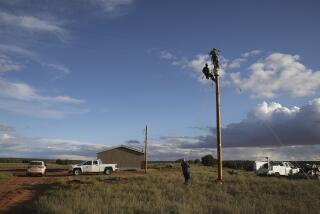Gabriel Vahanian dies at 85; key figure in âGod Is Deadâ movement
Despite a provocative title, Gabriel Vahanianâs book âThe Death of Godâ caused no public stir when it was published in 1961.
By the middle of the decade, however, a massive upheaval was underway in American society and Vahanian, a little-known Syracuse University professor of religion, found himself at the center of a furious national debate.
The French-born academic entered the spotlight in 1965 when Time magazineâs Easter week cover posed the question that Vahanian and other radical theologians had raised: âIs God Dead?â The arguments pro and con were still churning more than a year later, when the magazine noted that the easiest way to boost Sunday church attendance was to announce a sermon on the divine demise.
FOR THE RECORD:
Gabriel Vahanian: The obituary of theologian Gabriel Vahanian in the Sept. 16 California section said Time magazine ran a cover story asking âIs God Dead?â in 1965. The story appeared in 1966. â
Vahanian, a key thinker in what became known as the âdeath of Godâ movement, died of natural causes Aug. 30 at his home in Strasbourg, France, said his son-in-law, Jeffrey W. Robbins. He was 85.
Time had named him one of the four best-known theologians of the movement, which, according to the magazine, argued it was âno longer possible to think about or believe in a transcendent God who acts in human historyâ and that Christianity âwill have to survive, if at all, without him.â
In Vahanianâs view, America in the early â60s was a âpost-Christian world,â driven away from faith by the Holocaust and other World War II horrors.
âNow man has declared God not responsible and not relevant to human self-knowledge,â he wrote. âThe existence of God, no longer questioned, has become useless to manâs predicament and its resolution.â
That message found a receptive audience as the â60s unfolded in one convulsion after another â the assassination of a president and struggles over the war in Vietnam, civil rights and free speech.
âIt was a period of transformation, and his book was one of the expressions of â60s radicalism,â theologian Thomas J.J. Altizer, another prominent death-of-God theologian, said of Vahanian during an interview last week. âHe was articulating it theologically, and he had a better understanding than any of us of the actual death of God at that point in history.â
Postulating the death of God brought death threats to the group, which also included Paul van Buren and William Hamilton. Hamilton, who died in March, lost his teaching position at Colgate Rochester Divinity School in New York even though he was tenured.
Vahanian often joined his like-minded colleagues in public forums, but he was not in lock step with them theologically. A French Protestant who admired John Calvin and worshiped with a Presbyterian congregation, Vahanian approached the question of Godâs relevance from the vantage point of a lifelong churchgoer.
âHe was an iconoclastic thinker through and through,â said Robbins, who teaches religion and philosophy at Lebanon Valley College in Pennsylvania along with his wife, Noelle Vahanian, one of Gabrielâs two children.
Unlike others in the God-is-dead camp, Vahanian approached the issue as a cultural critic, looking for ways to talk about God in an increasingly secular world.
âHe was doing a cultural analysis, whereas the others were doing a more traditional philosophical, theological critique,â said James B. Wiggins, a longtime friend and colleague in the religion department at Syracuse. âFinding ways to give expression to the theological in terms that were intelligible to an ever more secular culture was the project in which he was engaged throughout his career.â
Vahanian was born Jan. 24, 1927, in Marseille, France. His parents, Mesrop and Perouse Vahanian, were Armenian refugees who had fled to France after World War I to escape persecution in Armenian areas of Turkey.
He earned a bachelorâs degree from the University of Grenoble in 1945, followed by studies at the Protestant Theological Faculty of Paris.
In 1958 he earned a doctorate at Princeton Theological Seminary and joined the Syracuse faculty. He led efforts to establish its graduate program in religion, which, Wiggins noted, was unusual for a secular university with no theology school. He also became a key figure in the study of religion and literature.
Vahanian remained at Syracuse for 26 years, leaving for France in 1984 to accept an appointment at Protestant Theological Faculty in Strasbourg.
He married Barbara Swanger in 1962. Besides his wife and daughter, he is survived by a son, Paul-Michel, and two grandchildren.
Although the public spotlight on his ideas receded, Vahanian âremained a death-of-God theologian in a profound sense,â Altizer said. âHe understood better than any of us the way God is dead in our cultureâ and especially how atheism was important to faith.
âThe Christian era has bequeathed us the âdeath of God,â but not without teaching us a lesson,â Vahanian wrote in his 1964 book âWait Without Idols.â âGod is not necessary, but he is inevitable. He is wholly other and wholly present. Faith in him, the conversion of our human reality, both culturally and existentially, is the demand he still makes upon us.â
More to Read
Start your day right
Sign up for Essential California for the L.A. Times biggest news, features and recommendations in your inbox six days a week.
You may occasionally receive promotional content from the Los Angeles Times.







